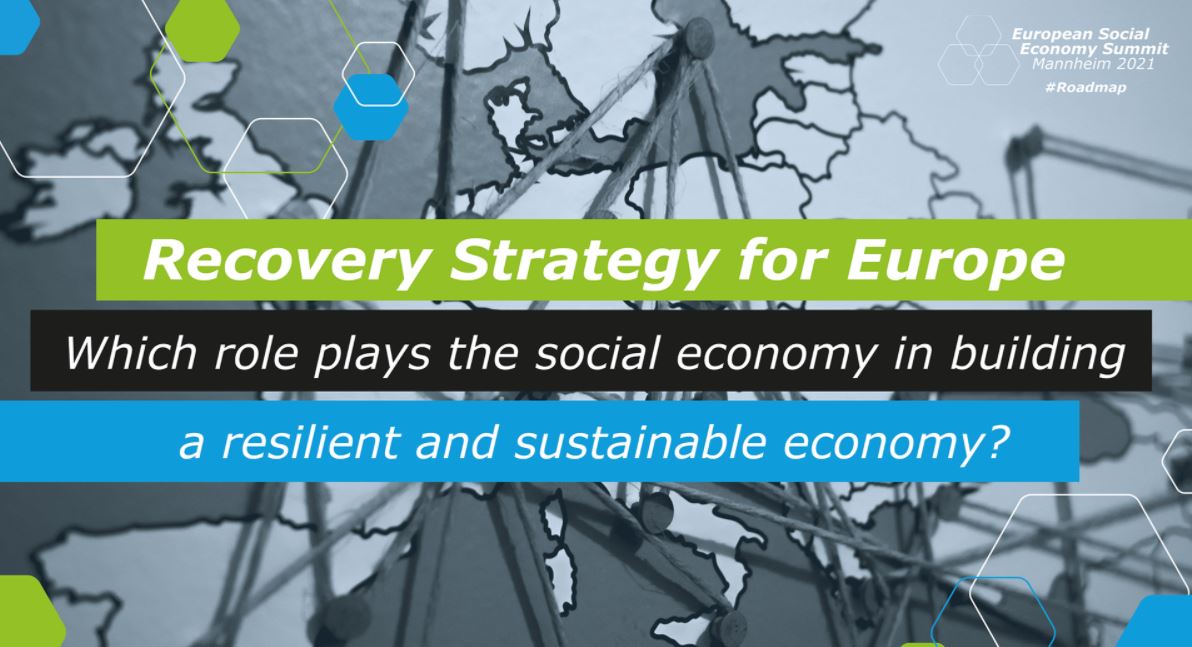Digitalisation, automatization and platform work – the most often used expressions when we are talking about digital transformations. It clearly has an effect on social economy as a whole and on social economy enterprises as well, but to what extent and what influencing factors are keys of success or failures to face with the challenges is a very interesting question – what about we do not know too much yet. Therefore, Diesis Network was happy to take the opportunity to discuss these impacts during a workshop at the third online exchange event of the European Social Economy Summit on the 26th of November 2020.
The panel was part of a 2-days online event, this time called „Recovery Strategy for Europe”. The „Digital Social Economy at work” workshop run by Diesis Network attracted more than 60 people.
The invited speakers all together represented an interesting mix from policy level through research to social economy practitioners. The speakers were:
- Karel VANDERPOORTEN (DG GROW – European Commission)
- Gianluca PASTORELLI (Executive President at Diesis Network) – moderator
- Feliciano IUDICONE (Research Officer, Fondazione Giacomo Brodolini)
- Victor MESEGUER (Director of Social Economy Europe)
- Melinda KELEMEN (senior labour market expert at Diesis Network) – moderator
- Samuel COHEN (Co-founder & CEO France Barter – France)
- John P. MURPHY (Chief Executive at Speedpak Group – Ireland)
- Jordi PICAS I VILÀ (Director of Innovation at Suara Cooperative – Spain)
- Anastasia Costantini (Senior Expert SDGs and Green Transition at Diesis Network) – organiser
In the first of the discussion, Karel Vanderpoorten was mentioning blockchain technologies and drew the attention to digital initiatives and tech solutions supporting social economy during COVID-19 times. He underlined the importance of traceability and value chains, democratic processes and energy provision in digital transformations. He also said that the social economy action plan coming out in end of 2021, of which content is not yet defined, but could include potential areas such as digital skills and access to technology.
Feliciano Iudicone introduced findings of the Seeding project Background Report. Among his main inputs, he stressed the importance of decision making on why and how to introduce new technologies for them to improve employment and working conditions. Social economy enterprises can feed these decisions with their experience and solutions. For this reason, their ability to influence debate and policies on digitalisation of the economy, also via their organisations, can contribute to narrow the existing digital divide and use new technologies to pursue workplace democracy and social inclusion goals.
Victor Meseguer has emphasized that the world is facing a massive digital and ecological transition, and Social Economy as an essential component of Europe’s social market economy needs to further embrace the digital and green transitions.
For that upskilling and reskilling of social economy employees and entrepreneurs is needed. That is why Social Economy Europe is currently proposing to create a partnership for the upskilling and reskilling of social economy employees and entrepreneurs, under the European Pact for Skills. He added that social economy is also a fantastic tool to democratise the digital economy and make it fairer and at the service of people.
The session proceeded with three examples taken from real life, just to show how diverse answers and reactions could be given to challenges. France Barter is a truly innovative example from France. It is a cooperative which created a company’s network and marketplace to exchange goods and services among the use of an internal token called Barter Euros. Their increasing membership during the Covid -19 is a good indicator for successful alternative transactional tool to help companies gain agility.
The company offering social services, Suara from Catalonia (Spain) shows how important to have strategic planning well in advance and prepare for upcoming changes on time since due to all the work done in previous years to Covid-19 they were able to give a good response to the pandemic crisis.
Finally, Speedpak from Ireland – a manufacturing and e-Commerce fulfilment company, hit hard by Covid – 19 crisis. Speedpak provides customised, flexible services to businesses which differentiates it from larger competitors. It also provides its services to other businesses that share its social values. This commercial activity enables the company recruit long term unemployed people, providing real work experience and industry led IT training to improve their employability this way they cope well with the situation.
The three case studies are also available on the seedingproject.eu website.
More information on the event and on EUSES 2020: https://www.euses2020.eu/exchange-events/november/

